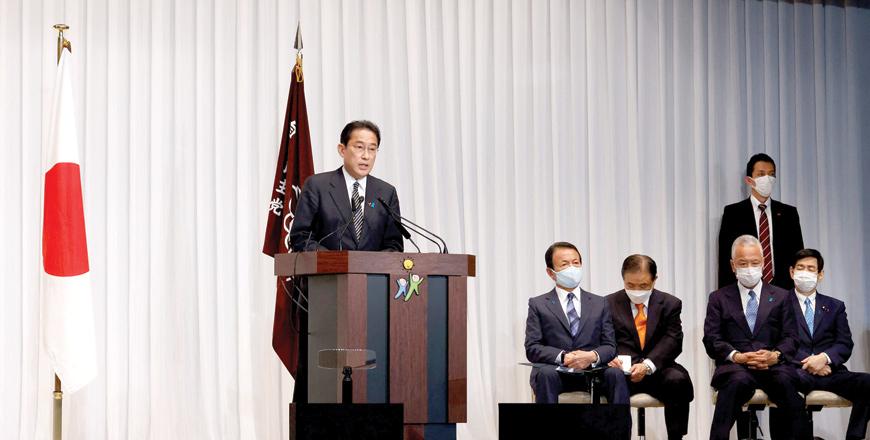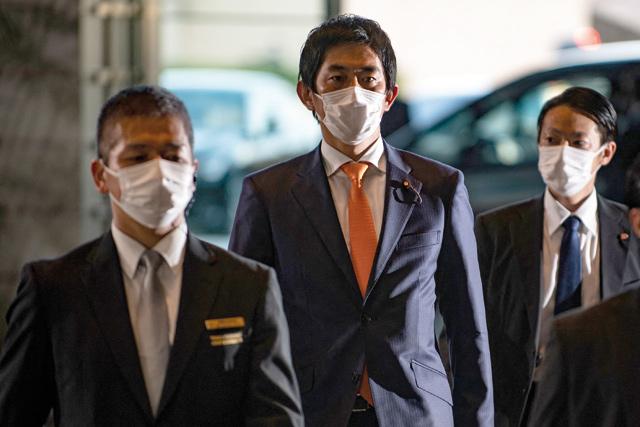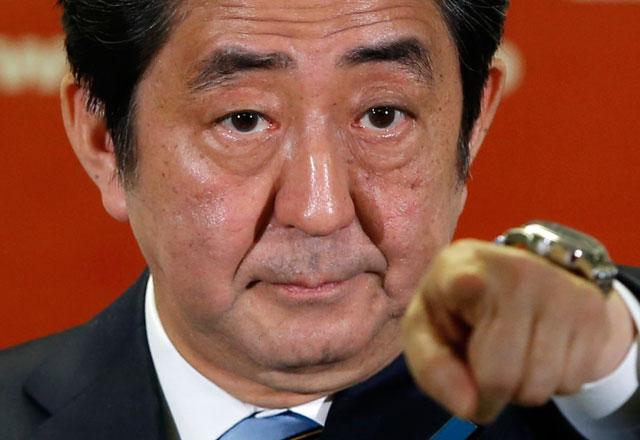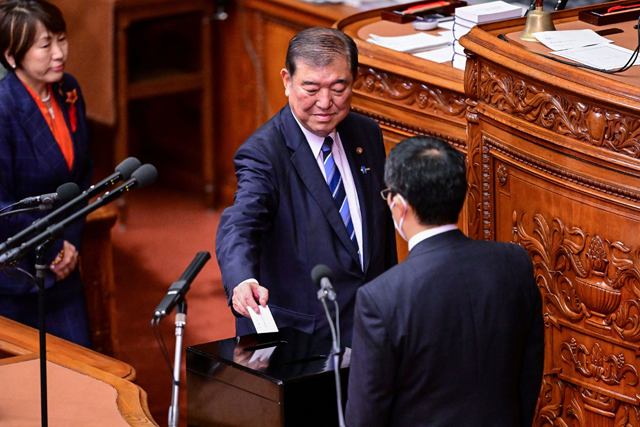You are here
Japan's PM Kishida calls victory after 'tough' election
By AFP - Nov 01,2021 - Last updated at Nov 01,2021

Japan's Prime Minister and ruling Liberal Democratic Party (LDP) leader Fumio Kishida (centre) attends a news conference at the party's headquarters in Tokyo on Monday (AFP photo)
TOKYO — Japan's Prime Minister Fumio Kishida declared victory on Monday after his ruling coalition won a strong majority in national elections, vowing to boost the virus-hit economy and "take a leading role" in Asia's push towards carbon neutrality.
Kishida, a soft-spoken centrist who has been in office for a month, said he would set out plans for a pandemic spending package this month in a bid to revive the world's third-largest economy.
Before heading to the COP26 summit, his first international engagement as prime minister, Kishida said he was committed to climate targets set by his predecessor Yoshihide Suga.
"We will not only stand firm on our 2050 carbon-neutral goal but also take a leading role in working towards zero emissions in Asia," he said.
The long-ruling Liberal Democratic Party (LDP) and its junior coalition partner Komeito won 293 of the 465 seats in parliament's lower house, local media reported while the official result was finalised.
The coalition had previously held 305 seats.
Low approval ratings for Kishida and a more cohesive opposition had posed challenges for the ruling bloc, but the result was better for the coalition than exit polls had predicted.
"It was a very tough election, but the people's will — that they want us to create this country's future under the stable LDP-Komeito government and the Kishida administration — was shown," the prime minister said.
Investors cheered the results, with the benchmark Nikkei stock index closing up 2.6 per cent.
Kishida took office after Suga resigned just a year into the job, partly due to public discontent over his response to the COVID-19 crisis.
'Large-scale' stimulus
Japan has recorded about 18,000 virus deaths, a comparatively low toll for its population of 126 million, and has never imposed a blanket lockdown.
But many businesses, especially bars and restaurants, have suffered through prolonged periods of restrictions on commercial activity.
Kishida said he would improve the health system's capacity to treat COVID patients and start booster shots from December.
He also promised to deliver “a large-scale economic stimulus” as soon as possible this year, without specifying how big it would be.
The 64-year-old has outlined plans to tackle inequality heightened by the pro-business policies of Suga and Shinzo Abe, Japan’s longest-serving prime minister.
The LDP has also pledged to increase defence spending to counter threats from China and North Korea.
“What do we really need in order to protect people’s lives... in this changing landscape?” Kishida said on Monday, adding that “the sum of a budget should not come first”.
Tokyo residents told AFP they were surprised by the election’s outcome.
“I had thought the LDP would lose more seats, but more people actually supported it than I expected,” said Kimio Okada, a 72-year-old retiree.
And Michiko Kitamura, 73, said she did not know why people voted for the ruling party, which has been in power almost continuously since the 1950s.
“I have the impression that the LDP has not been working for the country even though it has been in power for such a long time,” she said.
Newspaper editorials urged Kishida to act decisively to shore up public support ahead of a key upper-house vote next summer.
He needs to “fully prepare for a possible sixth wave of virus infections as early as this winter”, and firm up how his economic ideas will work in practice, the Asahi Shimbun daily said in an editorial.
In recent decades, votes against the LDP have been split between multiple major opposition parties, but this time five rival parties boosted cooperation in a bid to dent its stranglehold.
The Yomiuri Shimbun daily said the ruling party had been “forced to fight tough election battles” throughout Japan.
But differences in key policy positions between the two main opposition parties, the Constitutional Democratic Party of Japan and the Japanese Communist Party — especially over the country’s relationship with the United States — led to their defeat, the newspaper said.
Just under 56 per cent of voters cast their ballots, a continuation of the low turnout rates that have plagued the country’s elections in recent years.
Related Articles
TOKYO — Japan’s new prime minister Fumio Kishida pledged to combat the pandemic with fresh stimulus and fight income inequality after lawmak
Prime Minister Shinzo Abe on Monday vowed he would try to persuade a sceptical public of the need to revise Japan's pacifist constitution, the day after scoring a thumping election victory.
TOKYO — Japanese Prime Minister Shigeru Ishiba likes crafting model ships but his short tenure could come unstuck if the gamble of calling s
















